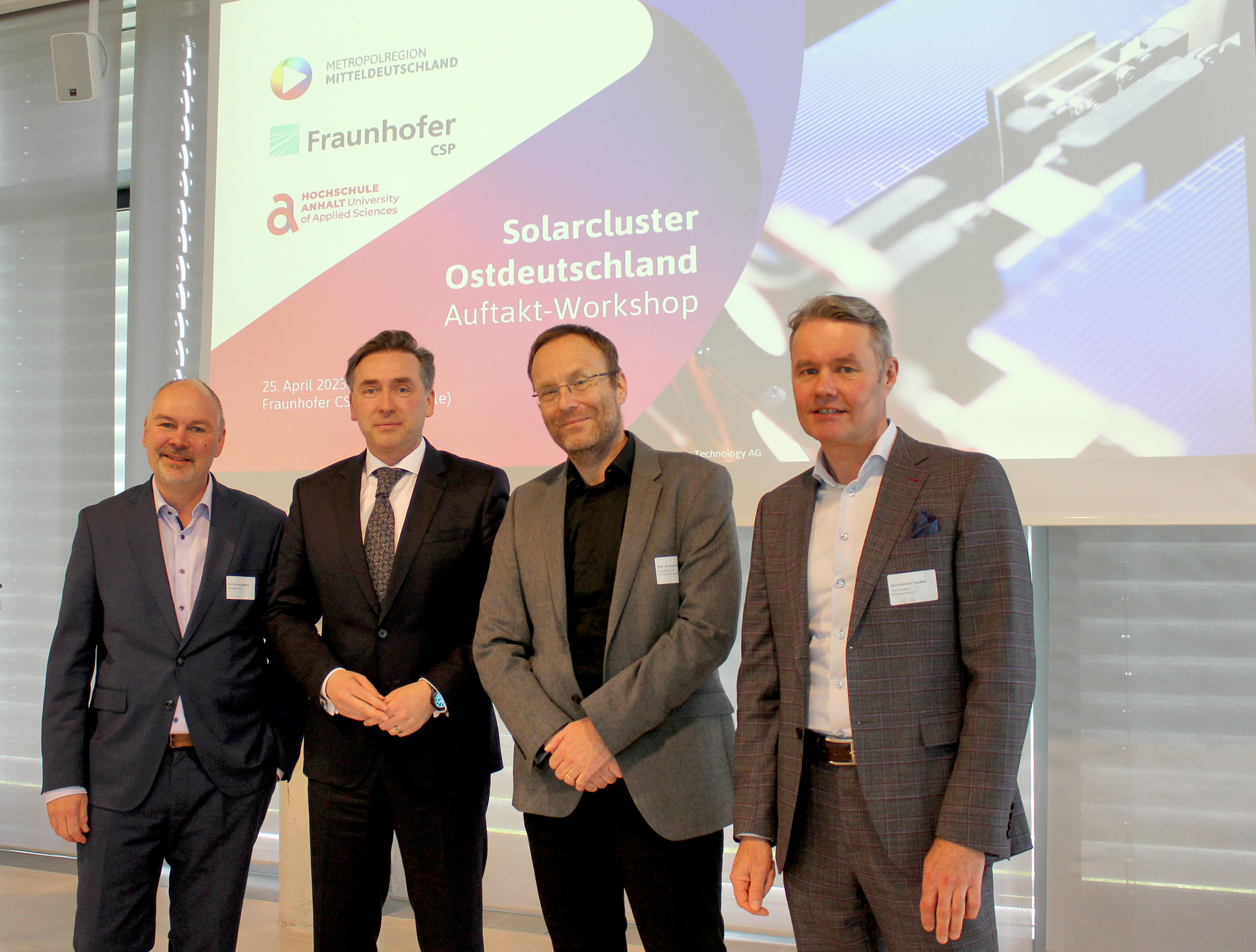East German solar industry discusses creation of industry cluster
On the initiative of the European Metropolitan Region of Central Germany, the Fraunhofer Center for Silicon Photovoltaics CSP and the Anhalt University of Applied Sciences, around 40 stakeholders from the eastern German solar industry and representatives from the States of Saxony-Anhalt, Saxony, Thuringia and Brandenburg gathered today in Halle (Saale). The workshop focused on the potential of the solar industry to create value for the region and the possibilities of institutional, cross-state cooperation.

In his welcoming address, Thomas Wünsch, State Secretary in the Ministry of Science, Energy, Climate Action and the Environment of the State of Saxony-Anhalt, endorsed the reestablishment of a solar cluster in eastern Germany: "Photovoltaics is a central building block for the energy transition, but Germany and Europe are currently heavily dependent on imports from the Far East. Rebuilding the domestic solar industry is therefore of high priority. Especially eastern Germany bears considerable potential - companies and research institutions are still among the world's technological leaders; in addition, new PV capacities are being set up for example by Meyer Burger in the Thalheim Solar Valley. An eastern German solar cluster can support this positive development and strengthen the cooperation of all players." In addition, Wünsch reported on the results of the 1st Conference of Energy Ministers of the German federal states in Merseburg at the end of March, as well as the activities of the SIRE network, an organization of European solar industry regions of which Saxony-Anhalt are also members.
“Achieving the path to the decarbonization of the energy supply and the development of a green hydrogen economy in Central Germany requires a significant increase in the production of green electricity. The solar industry plays a key role in this respect. We want to contribute to energy sovereignty and strengthen regional value creation with this cross-state cluster initiative,” explains Jörn-Heinrich Tobaben, Managing Director of Metropolregion Mitteldeutschland Management GmbH.
"Building on existing experience and structures, eastern Germany can once again become a driving force of the European solar industry. This requires long-term market-oriented business models, intensive research activities for the next generation of photovoltaics and, last but not least, the training of appropriately skilled workers," emphasizes Prof. Dr. Ralph Gottschalg, Head of Fraunhofer Center for Silicon Photovoltaics CSP.
"The rapid transfer of innovation between science and business is a critical success factor for the competitiveness of the German solar industry. Universities and research institutions in Central Germany bear a significant research and transfer potential in the field of photovoltaics that can be profitably incorporated into research and development projects," says Prof. Dr. Jörg Bagdahn, President of Anhalt University of Applied Sciences.
New network aims to focus primarily on regional SMEs
During the workshop, participants intensively discussed the goals and fields of action of an eastern German solar cluster. In the future, this network is to represent - in addition to manufacturing companies - primarily small and medium-sized market participants from the region along the entire value chain, such as service providers, plant operators and project developers. Potential fields of action for the new network include the training and further education of specialists, joint location marketing activities, advice on funding opportunities and expert support for the regional implementation of national and European solar strategies.
The event was based on an analysis of regional industry players along the entire PV value chain in Saxony, Saxony-Anhalt, Thuringia, and Brandenburg, which was jointly prepared by the three initiators. According to this analysis, 253 companies and institutions related to the solar industry are located in the four states, including 37 manufacturing companies and service providers, 19 scientific institutions, 25 project developers and 37 training and education providers. The region thus has a critical mass of players for a transnational cluster process and has the potential for a solar industry region of European standing, according to the study.
Steps for further cooperation agreed
As a result of the workshop, the partners present agreed on the next steps of their cooperation. For example, the three initiators of the workshop were asked to work on an organizational and financing concept for the Solar Cluster East Germany in close coordination with the federal states. The formal establishment of the new network is to take place in the second half of 2023. At the same time, other stakeholders from business, science and administration are invited to participate in the process.